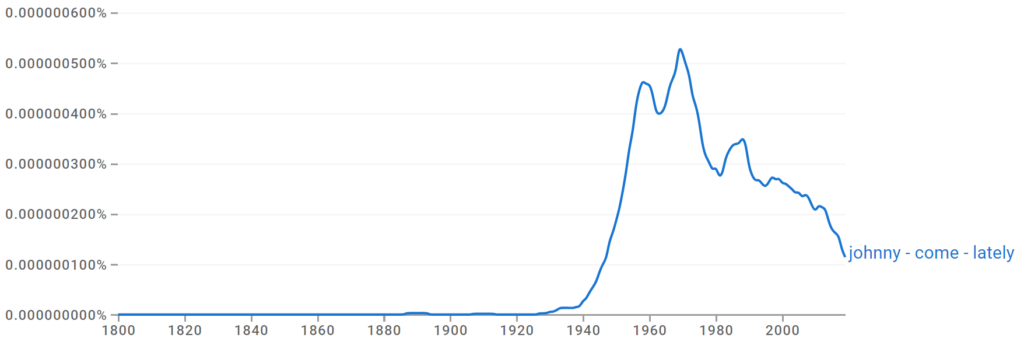Johnny-come-lately typically refers to someone recently taking part in a trend or activity and acting like an expert or original despite being new to it.
Idioms like Johnny-come-lately are groups of words that mean different from the individual words’ literal interpretations. And, while it might sound easier to be more literal and direct, idioms give us ways to connect with others in a more visual sense that triggers our senses, so the intent is more relatable.
But where did this term originate from? What are its nuances? My guide will cover Johnny-come-lately’s meaning and origin while sharing some great examples from literature and media, ensuring you’re no Johnny-come-lately when it comes to understanding how to use this idiom!

What Does Johnny-Come-Lately Mean Today?
Johnny-come-lately is what you’d call someone who shows up late and then acts as if they’re the expert on whatever situation is at hand. Our trusty dictionaries might differ in wording, but they echo a consistent theme for this idiom.
The Merriam-Webster Dictionary states that Johnny-come-lately just means a late or recent arrival, a newcomer.
But the Collins Dictionary adds a bit more nuance to the definition, saying that it’s what you’d call a brash newcomer, novice, or recruit. Adding the word brash leans closer to the intent behind this phrase.
What Are Its Current Connotations?
Today, we use the phrase Johnny-come-lately when referring to a newcomer. However, the term is supposed to carry a hint of criticism, implying that the person is presumptuous or opportunistic. They might act like they’ve been around forever when they’re actually the new kid on the block.
The idiom Johnny-come-lately has both a literal and a figurative interpretation; its use depends on the context you’re dealing with. Let’s take a look.
Literal Use
In its most straightforward sense, Johnny-come-lately is what you’d name a person new to a place or some kind of activity. It could be someone recently joining a group, moving into a neighborhood, or taking up a new hobby among other hobbyists.
If someone just joined a book club you’ve been running for years, members might refer to the newcomer as a Johnny-come-lately to show they’re the newest member. In this sense, there’s no negative context applied. They’re simply new.
Figurative Use
Figuratively, Johnny-come-lately can come across as a bit derogatory to describe someone perceived as an opportunist or someone jumping on the bandwagon. In this context, it implies that the person is late to adopt a trend or activity and might be seen as less genuine or authentic.
A great example is when a person suddenly becomes a fan of a sports team only after the team starts winning. Long-time fans might dismissively call this person a Johnny-come-lately because their sudden support seems fickle or fake.
In What Contexts Is It Commonly Used?
As I just mentioned, the idiom can be used on the more literal end of things, but it’s more commonly used figuratively.
Let’s say you run a book club in your hometown, and a new member joins while the group is in the middle of reading the latest book. In this case, they’re a Johnny-come-lately simply because they joined late and are a newbie.
But let’s take that same scenario and have the newcomer join your book club but immediately start acting like they’re in charge or know the author of the book. They’d be a Johnny-come-lately but with a negative context surrounding it.
What Is the Origin of the Term Johnny-Come-Lately?
The idiom Johnny-come-lately is an American adaptation that emerged in the 19th century, seemingly rooted in the British expression Johnny Newcome from the early 1800s. This term was typically used to describe a sailor who had just joined a naval ship.
When Was It First Used?

The American rendition, Johnny-come-lately, is believed to have first appeared in Charles F. Briggs’ 1839 novel, “The Adventures of Harry Franco,” where a young mizzen topman says, “But it’s Johhny Comelately, ain’t it, you?”
How Has Its Usage Evolved Over Time?
Over the past few centuries, the idiom Johnny-come-lately evolved from a simple term to name new soldiers to a figurative phrase we use to describe newcomers. It also points out someone who’s a bit over the top and too obvious about their sudden enthusiasm over something.
How Is Johnny-Come-Lately Used in Literature and Media?
Johnny-come-lately is often used in literature and media to describe a character who is new to a situation or scene and possibly acts more knowledgeable or experienced than they actually are.
Are There Famous Literary or Cinematic Examples?
Yes, the phrase Johnny-come-lately has indeed found its place in various mediums of art:
- Movies: There’s a 1943 film named “Johnny Come Lately” starring James Cagney. The title, derived from the idiom, is a fitting descriptor of the main character, a newcomer who shakes up the status quo when confronted with a moral dilemma of choosing between integrity and money.
- Literature: One of the earliest instances of the idiom’s use in literature is in the 1839 novel “The Adventures of Harry Franco” by Charles Frederick Briggs.
- Music: The idiom also made its way into music with Steve Earl’s song “Johnny Come Lately” from 1988. The song narrates the experiences of a latecomer, keeping in line with the idiom’s traditional usage.
How Does Media Influence Its Perception?
The media tends to use the idiom in a negative context to paint the image of newbies having an agenda you can’t trust. It makes us suspicious of newcomers in general, which can create an unnecessary stigma.
What Similar Idioms or Expressions Exist in Other Languages or Cultures?
In French, there’s nouveau riche, which translates to new rich but can be used in similar contexts, pointing to someone new to wealth and perhaps a tad too flashy about it.
What Are Other Idioms and Phrases Related to Johnny-Come-Lately?
Here are a few other idioms or phrases that are similar in their meaning to Johnny-come-lately.
- Me-tooer: This is someone who always says they understand or have previously experienced what you’re going through, even when they haven’t.
- New kid on the block: A phrase used to describe someone who just moved to town, like a student who shows up halfway through the school year and needs to learn the lay of the land, aka the student body.
- Latecomer: Simply someone who shows up late.
- Blow-in: Someone who casually shows up, usually so quietly you don’t notice.
- Greenhorn: This term is mainly used in blue-collar settings to describe an inexperienced worker.
Why Is Understanding the Meaning of Johnny-Come-Lately Important?
Understanding Johnny-come-lately boosts effective communication. This idiom aids in comprehending conversations, especially with native English speakers. It enhances the understanding of English in spoken and written forms.
The idiom also provides cultural insights and is often found in literature, movies, and songs. Mastery of idiomatic expressions like Johnny-come-lately marks advanced English language proficiency and enables more vibrant use of language. Finally, understanding this idiom can help interpret others’ behaviors and attitudes accurately.
How Does It Enrich Communication?
It enriches communication by providing a throwback to older times. It serves as a reminder that language can evolve, and certain phrases can still have a home in modern society. Like all idioms, it gives us alternative ways to relate to others.
What Potential Misunderstandings Might Arise From Its Misuse?
You need to understand an idiom’s deeper meaning and origin before you use it. Some cultures may find it offensive, and others may say it differently. You might call someone a Johnny-come-lately because they’re simply new. But they may take it as you’re calling them ostentatious.
How Can One Incorporate Johnny-Come-Lately Into Everyday Language?

It’s as easy as saying, “Ever since the new guy started practicing yoga, he acts like an expert. Such a Johnny-come-lately!” It would be more offensive and unlikely something you should say to the person’s face.
If you had a friend who was always late but still managed to show up, you could say, “You’re such a Johnny-come-lately, but I’m just glad you came.” You’re noting how they’re never on time but assuring them it’s okay because you’re just happy to have them there.
Are There Tips for Using It Effectively?
- Always read the room before using an idiom to avoid miscommunication or unintended offense.
- When writing it, always hyphenate all three words.
- Always capitalize the word Johnny.
Can Overuse Diminish Its Impact?
Overusing any idiom can reduce its impact because it becomes annoying and redundant.
Watch Out for Johnny-Come-Lately
The idiom Johnny-come-lately serves as a vibrant language tool that adds depth to our communication, signaling latecomers acting as experts. As presented in this guide, understanding its origin, meaning, and usage helps us become proficient and effective in employing such expressions.
With examples from literature and media, we get a clear picture of its application. Consequently, in comprehending the nuances of this idiom, we ensure we’re not latecomers in the art of idiomatic expression. If you’re ready to move on to the next one, check out all my idiomatic guides on our site!
